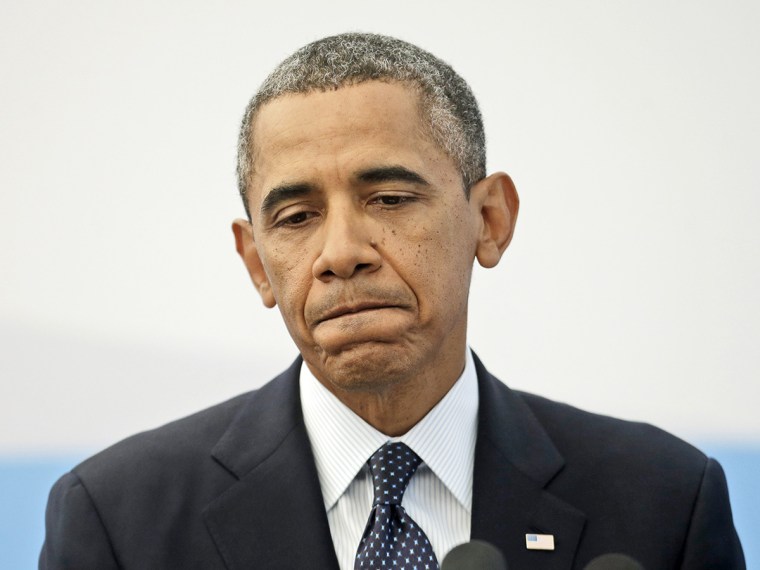At the end of a two-day summit in Russia, President Obama acknowledged the reluctance of Americans, the world, and even his own wariness to enter global conflicts after a decade of costly American wars in the Middle East.
"I was elected to end wars, not start them. I’ve spent the last four and half years trying to reduce our reliance on military," he said. "We have to make hard choices if we're going to stand up for things we believe in, and I think this is one of those times."
Obama said he recognized the "heavy lift" it would take to convince both Congress and the American public that military action on Syria was the best move forward. The president said he would address the American people from the White House Tuesday. "I will make the best case I can," he said.
"It's conceivable that at the end of the day I don't persuade a majority of Americans that it is the right thing to do," Obama added.
Obama is seeking congressional approval of a U.S. strike on the regime of President Bashar al-Assad after the administration said it found proof that his government had killed more than 1,500 in a nerve gas attack. The full Congress returns to session in Washington on Monday where they are expected to begin debate and vote on the administration's proposal to strike after a week of hearings on the Hill.
In a nearly hour-long news conference from Russia, a tired looking Obama was repeatedly asked to comment on congressional concerns and whether he would order a strike without its approval, a question he declined to answer. The president rejected reports that he had asked the Pentagon to create an expanded list of targets for potential military strikes and reiterated that his administration was focused on a limited--yet unspecified--intervention. Among the concerns is whether a U.S. strike could embolden Assad to use chemical weapons again--or if a strike would even weaken him enough to have an impact in the ongoing two-year civil war that has left 100,000 dead and millions displaced.
"Is it possible Assad doubles down in the face of our action and uses chemical weapons more widely? I suppose anything is possible," the president said. "But it wouldn't be wise. I think at that point, mobilizing the international community would be easy, not harder."
The Obama administration has sought to shore up international support from allies in recent weeks, an effort that failed in Britain last week but has gained support from the Arab League. The League Sunday urged the United Nations and the international community to "take necessary measures" against the Syrian government without outlining what that action might be.
The president made a direct pitch to other world leaders at the G-20 summit in Russia Thursday and Friday. Host Russian President Vladimir Putin continues to oppose a strike but Obama said that a majority of world leaders at the meeting were "comfortable with our conclusion" that Assad had used chemical weapons. Yet, he was not leaving Russia with a mandate from those same leaders to approve a U.S.-led strike on Damascus.
Putin in a separate press conference Friday called his meeting with Obama “friendly,” but said the two leaders will “stick to their guns.”
The president said he would prefer to work through multilateral channels, such as the U.N., in going forward with a strike but called the international community "paralyzed and frozen."
"The Assad’s regime’s brazen use of chemical weapons isn’t just a Syrian tragedy, it’s a threat to global peace and security," Obama added. "Syria’s escalating use of chemical weapons threatens its neighbors: Turkey, Jordan, Lebanon, Iraq, Israel. It threatens to further destabilize the Middle East, it increases the risk that these weapons will fall into the hands of terrorist groups."
"These kind of interventions are always unpopular because they seem distant and removed," he continued.
The president pointed to recent incidents of genocides in which military interventions were found as widely unpopular--namely in Kosovo and Rwanda--yet were the “right thing to do.” The hundreds of thousands that were slaughtered in Rwanda left “a terrible stain on all of us” he said, adding that unpopularity did not in history’s eyes justify the international community’s inaction.
Obama’s national security adviser Susan Rice faced harsh criticism, drawn primarily from now-U.S. Ambassador to the U.N. Samantha Power, for not doing enough in her capacity at the time as assistant secretary of state for African affairs under President Bill Clinton to prevent the genocidal violence in Rwanda. The inaction in Rwanda haunted a Democratic administration, a shadow the Obama administration is looking to outrun.
The president said the only popular military inventions are those that show a direct military threat. Obama chided the efforts of previous administrations in using “various hooks”—such as those used in the Iraq War-- to stoke support for military action.
Despite lacking the “hook” of an imminent threat, Obama remained confident in the administration’s polling operation that he said showed enough U.S. support to warrant military action in Syria.
“Where you will see resistance is people being worried about a slippery slope and how effective a limited action might be,” he said.
Amanda Sakuma contributed writing to this report.
